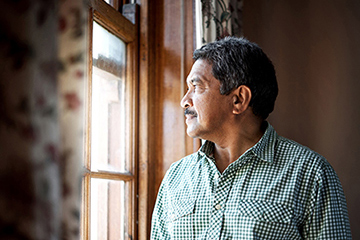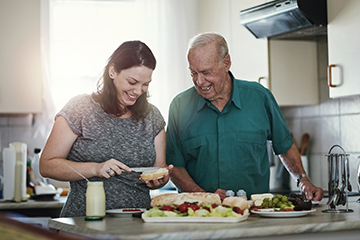Preventing elder abuse
 The abuse of elderly people happens in their own homes, or while living with family and in facilities responsible for their wellbeing. We must speak up when we suspect that an elderly person is being financially exploited, neglected, or harmed by their caregiver.
The abuse of elderly people happens in their own homes, or while living with family and in facilities responsible for their wellbeing. We must speak up when we suspect that an elderly person is being financially exploited, neglected, or harmed by their caregiver.
Our constitution protects the rights of all, especially the vulnerable, and this includes the elderly. In South Africa, 8.1% of the population is older than 60 years.
All of us deserve to be respected, to feel dignified and safe where we live. Find out how to spot the warning signs, know the risk factors, and how you can prevent and report instances of abuse.
What is elder abuse?
Elder abuse is the neglect or mistreatment of an older person, who can’t or doesn’t have the means to fend for themselves. This kind of mistreatment can take place in a person's private home or old age homes.
There are various forms of abuse and mistreatment, ranging from:
- physical abuse
- sexual abuse
- emotional abuse, and
- financial exploitation.
 Intentionally or unintentionally neglecting to care for an elderly person is also abuse.
Intentionally or unintentionally neglecting to care for an elderly person is also abuse.
Taking and withholding a pensioners South African Social Security Agency (SASSA) card without their consent is illegal. Loan sharks are known to take the cards and give pensioners loans with very high interest rates that are impossible to repay. Some companies prey on the elderly by illegally deducting money from their pension. You can report any suspected fraudulent activities regarding pensions or grants on SASSA's toll-free number 0800 60 10 11 or 0800 701 701.
The act of forcing or convincing an elderly person to change their will or to persuade them to give power of attorney is also financial abuse.
What are the signs of elder abuse?
Signs of abuse may vary from physical, such as bruises, scratches, cuts, malnutrition, lack of medical care, and behavioural such as withdrawal, fear, and anxiety.
An important indication of abuse is based on what an older person says. Claims of abuse or mistreatment should be reported and investigated.
Elder self-neglect
A common form of elder abuse encountered by caregivers of older persons is self-neglect. When the person experiences physical or mental impairment or diminished capacity, they may no longer be able to care for themselves. Signs to look out for are:
- a lack of personal hygiene or cleanliness,
- dehydration,
- malnutrition,
- being underweight,
- living in dirty conditions, and
- unable to pay bills or manage medications.
Self-neglect may be a sign of depression, Alzheimer’s, dementia, grief, or any other health issue. They may refuse to seek help due to denial, worried about losing their independence and feeling ashamed for needing outside help.
 7 ways that you can make a difference in the lives of older people
7 ways that you can make a difference in the lives of older people
1. Visit or call your elderly loved ones and invite them to family gatherings and other special occasions.
2. Older people have valuable skills and knowledge. Find out what talents and skills your older family members, friends,and community members have that they can share with you, your family, or the community. Examples of skills are knitting, baking, cooking, gardening, sewing, etc.
3. If you know of an elderly person who has a family member or a professional person serving as a caregiver, support this person by helping and making sure they get a break.
4. Contact your non-governmental organisations that support the elderly and offer your support in the form of donations, fundraising, or volunteering.
5. Volunteer your time and service to old aged homes or to a housebound elderly person.
6. Talk about elder abuse to your friends and family to create awareness so that we can bust the myths and stigmas about this kind of exploitation of the vulnerable.
7. Offer to take them to do shopping or run errands. If the person has problems with mobility, you can offer to do it for them.
What can I do to stop elder abuse?
Elder abuse is a crime in South Africa. The Department of Social Development works closely with NGOs to prevent elder abuse. If you suspect elder abuse, you can contact your nearest Social Development office.
There are non-governmental organisations that deal with the abuse of the elderly and whose mandate includes social work intervention services, counselling, awareness campaigns and initiatives. You can contact:
Contact: Ms Irene Snell-Caroll
Email: irene@age-in-action.co.za
You can report human rights violations to:
South African Human Rights Commission (Western Cape)
Contact: Shafeeqah Salie
Tel: 021 426 2277
Email: ssalie@sahrc.org.za or sahrcinfo@sahrc.org.za
You can also report cases of elder abuse at your nearest police station
For financial irregularities (e.g. unauthorised deductions), please contact:
South African Social Security Agency (Sassa)
Toll free: 0800 60 10 11
Email: GrantEnquiries@sassa.gov.za
Or
SASSA Western Cape Office
Address: Golden Acre, Adderley Street, Cape Town, 8001
Tel: 021 469 0200
Fax: 021 469 0260
Email: GrantsEnquiriesWC@sassa.gov.za


